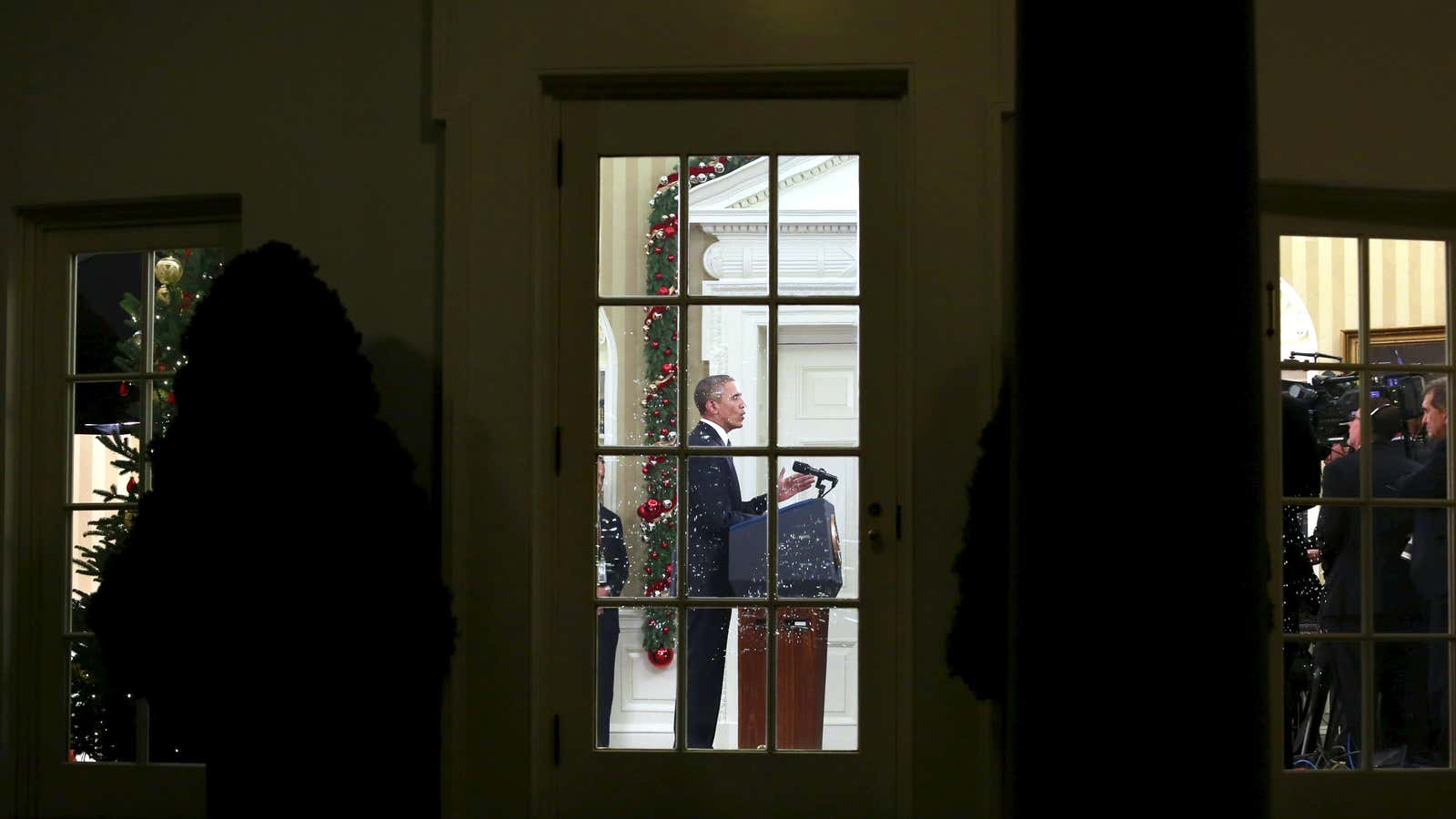The reviews are in after President Barack Obama’s speech to the American people yesterday: It was weak-sauce, it was a yawner, he didn’t change anything!
American pundits seeking emotional satisfaction aren’t used to seeing citizens treated like adults by their political leaders. But Obama’s speech, if lacking in soaring rhetoric, offered needed clarity about US anti-terror policy at a time of panicked public rhetoric.
The decision to produce a rare prime-time address comes in the wake of tragedy in San Bernadino, California, where a couple apparently under the influence of Islamist ideology murdered 14 on Dec. 2. With the brutal Paris attacks just weeks before, responding to the Islamic state and its global terror apparatus is top of mind in the US.
Obama’s key point last night was simple: These attacks were an extension of the same terror fight that has occurred since 9/11, and the US is far better defended today than it has ever been. Terror attacks in the US today don’t come from organized conspiracies abroad but from ideologically motivated sympathizers. And the US is executing—and escalating—a strategy to push that threat further away. It’s easy to be scared, but the US is winning.
Republican presidential candidates have described the situation as a world war and cast the terror threat against the US in apocalyptic terms, as they race to win over the electorate. But despite big talk from those seeking Obama’s job, careful examination of their policy positions demonstrates little difference from those of the administration. Complex problems don’t have easy answers—just consider Hillary Clinton’s 24 step plan to beat ISIL.
That’s not to say that Obama’s policy has been successful so far—the administration did not act quickly enough to stem ISIL from gaining ground in a broken Iraq or dominating Syria’s civil war, and it is allowed Libya to essentially become a failed state. But many have too eagerly framed Obama’s choice not to send large deployments of US troops to Syria and Iraq as a mistake.
Want blood? Consider that US airstrikes have likely killed far more ISIL members than ISIL has killed in the US—or indeed, in Europe. (It’s also likely that more civilians have been killed as collateral damage than US citizens have died).
Three additional countries are joining in those strikes even as US jets increase their tempo. Besides aerial forces, the US is also sending an expeditionary force into Iraq, ostensibly to help target airstrikes. But no one can argue that a full-scale invasion would actually end the evolving problem of terror havens. Even Michael Vickers, the planner of campaigns in Afghanistan who wants Obama to simply do whatever it takes to destroy ISIL, merely waves his hands when it comes to post-conflict solutions:
Dislodging ISIL and Al Qaeda from Syria does not mean, moreover, that US forces have to occupy and try to pacify the country afterward. As we should have learned, that does not play to our strengths. There are a lot of operational options between what we did in Iraq and what we didn’t do in Libya.
That’s hardly reassurance that the US can break the cycle of failed states that it has already helped create in the Middle East.
In his speech, Obama also laid out an agenda for Congress, proposing gun control measures to make it more difficult for would-be terrorists to arm themselves and a new authorization for the use of force in the Middle East. This proposal has been languishing before US lawmakers for almost a year now, with few willing to stand up and vote on a strategy.
Obama’s steadfastness in the face of two battles—against a virulent terrorist ideology, and against those who would wildly overreact to it—is obviously not an easy sell. But it is characteristic of the finest moments of his political career, including his refusal to panic like rival John McCain as the financial crisis overtook his first presidential campaign, his steady push to enact the Affordable Care Act and financial reform despite adverse election results in 2010, and approval of a risky operation to kill Osama Bin Laden.
Sometimes, leadership isn’t about telling people what they want to hear, but what they need to hear.




